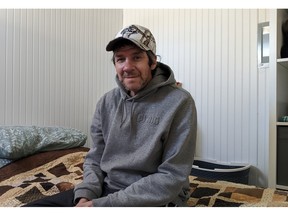Humanity Project bunkhouses are getting people off the streets of Moncton
Director says 13 of 21 little houses are now occupied by street people in need of medical attention

Article content
LITTLE RIVER • Jason Ward normally wears a size nine boot, but he had to move up to a size 12 due to extreme swelling from an infection, which nearly ended with an amputation.
“It started out like a little pimple and it expanded and kept growing from the top of my foot up to my knee,” says Ward, who recently moved into one of the 21 bunkhouses at the Humanity Project farm in Little River, approximately 30 kilometres southwest of Moncton. The little house provides him with his own door, bed and living space for the first time in seven years.
“I had an infection for six years and finally started getting treatment from the Salvus Clinic last winter. If I hadn’t, they told me they might’ve had to cut it off, so I almost lost my leg.”
Ward, 49, is originally from Labrador City and came to New Brunswick about 10 years ago, living in Moncton and Sackville. He worked as a cook and in construction, but fell into the world of drug use. In 2016, after the death of a friend, he was consumed by the highly addictive drug known as crystal meth, which affects the central nervous system.
“I fell in with some bad people. When you fall in with people who are being bad, nine times out of 10 you are gonna follow in their footsteps and end up being the same,” he said in an interview at the farm Friday. “Meth is very addictive and it’s very easy to fall into and it’s not a good thing to fall into, because you’ll find anything to do to get it. I would tell kids to stay away from it.”
Ward is now living in one of the 21 bunkhouses at the Humanity Project farm that are providing homes for people from the streets of Moncton.

The little houses are eight feet by 10 feet and lined up along a path leading to the main house. The single-person bunkhouses each have their own door, window, bed, fridge, shelving unit, desk, and mini-split heat pump system. They don’t have their own washroom, since they are just a short walk from the main building of the farm, which has bathrooms, laundry facilities and a combination living room/dining room/kitchen with a wood-burning stove, big screen TV set, couches and tables.
“I’ve worked as a cook, roofing, painting, plastering. I want to get back to the workforce. And now I have a second chance at it,” Ward said.
Bunkhouse project was funded by City of Moncton
The City of Moncton provided the Humanity Project with $310,000 to build the little houses, while the province is providing more than $1.2 million for support services to help get people off the streets and into housing so they can begin the process of turning their lives around. Staff from the Salvus Clinic visit the farm regularly with their mobile unit to provide residents with medical treatment.
Charlie Burrell, director of the Humanity Project, says 13 of the 21 bunkhouses are now occupied and more people are on the way. He said people who qualify for the program must first go through detox for alcohol and drug addiction.

‘It’s about getting people healthy again’
“The farm is a lot more than getting people off drugs and alcohol,” said Burrell, pointing to a schedule of names and appointments on the blackboard in his office. “It’s about getting people healthy again and helping them move forward. A lot of them haven’t had any medical attention for years and years. We’re treating the symptoms of addiction, but we’re also treating the symptoms of long-term homelessness and the trauma that comes with it.”
Burrell said giving people their own space after years of living on the streets and in shelters is a huge transformation. Street people are used to living in constant “survival mode” and worrying about their next meal, whether they will be assaulted or have their few personal things stolen.
He says the farm is gradually transforming into a place where people help each other as they change their habits back to “normal” life. The main building has space that is already partitioned into rooms that could eventually become a dormitory.
New residents coming here are scheduled for medical and dental treatments, along with mental health treatments. Burrell said people who fall into drug and/or alcohol addiction are often victims of trauma, including childhood sexual abuse.
“What we need to do here is help people get off drugs, identify why they were using drugs in the first place, give them the skills they need to drop their addiction and move forward in life, and give them a plan to find success in their own lives,” he said.
The farm will initially offer 21 bunkhouses to help get people off the streets of Moncton and into a new environment, but Burrell estimates there are at least 300 people in Moncton who are homeless or living rough, depending on shelters and places where they can sleep for a night.
At the final city council meeting of the year, the Greater Moncton Homelessness Steering Committee read the names of 55 people who died on the streets of Moncton in 2023. Burrell said another person died this week.
The Humanity Project’s headquarters on St. George Street continues to serve over 200 meals daily to the homeless and people who can’t afford to eat. Burrell said they are in need of volunteers daily from 4 p.m. to 7 p.m. to help serve meals and clean up afterwards.












Postmedia is committed to maintaining a lively but civil forum for discussion. Please keep comments relevant and respectful. Comments may take up to an hour to appear on the site. You will receive an email if there is a reply to your comment, an update to a thread you follow or if a user you follow comments. Visit our Community Guidelines for more information.